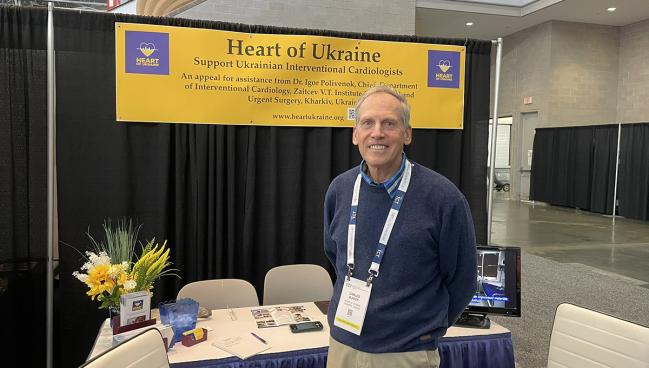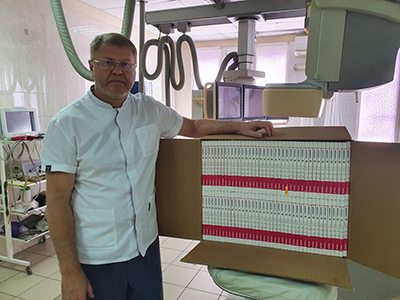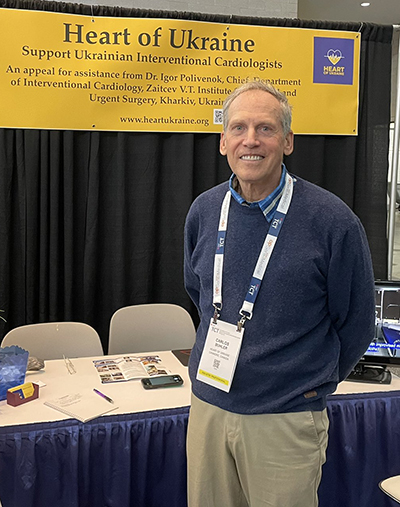From Mountains to Meds: A Grassroots Effort Is Restocking Cath Labs in Ukraine
A chance encounter between a mountain climber and a cardiologist paved the way for US cath labs to donate supplies.

Photo Credit: Bailey Estes
Carlos Buhler has spent decades planning new routes and climbing some of the most difficult and beautiful mountains in the world, but his most recent planning covered some very different terrain: routing sterile dressings, stents, balloons, and guidewires, as well as lidocaine, antiplatelet drugs, P2Y12 receptor inhibitors, and cholesterol-lowering agents, from North America to cath labs in Ukraine.

Buhler, 68, a world-class alpinist, had traveled to the Poland-Ukraine border in April 2022 as a volunteer with the nonprofit World Central Kitchen, planning to spend several weeks washing dishes and serving meals to refugees. As his trip was nearing its end, he accepted a ride into Ukraine, hoping to meet up with a friend who he knew was working there as a journalist. That friend introduced him to Igor Polivenok, MD, PhD, an interventional cardiologist at the Institute of General and Urgent Surgery in Kharkiv, Ukraine, who told Buhler about some of the dire shortages at his hospital and others.
That meeting spawned an ambitious idea to create a direct donation pathway to use spare, expired, or near-expired items from cath labs in the United States. As Buhler explained, items perceived as valuable, such as pricey stents, could be appealing to unscrupulous border guards and others. With Polivenok seeking the specific quantities needed for patients awaiting procedures, the loss of even a few of those items to the black market or "shrinkage," as he referred to it, was a risk Buhler didn't want to take, so he needed an alternative to taking the supplies himself or shipping them in a standard manner.
Polivenok and colleagues have learned to work with constant shelling in the background of their daily routine, keeping the hospitals going with generators. Hallways that once bustled with activity are quiet, the staff is about one-third the size it once was, bed linens and clothing hang in stairwells to dry. But interventional procedures and cardiac surgeries for adults and children continue.
While basic medical supplies and items dedicated to trauma patients are delivered weekly to Ukraine, “we as an interventional cardiology community are faced with significant shortage in specific supplies for interventional procedures—like catheters, guidewires, stents, etc,” he told TCTMD.
It made a difference for Ukrainian people, . . . and it means a lot for us. Igor Polivenok
On their own, Polivenok and colleagues had requested and received shipments of donated cath lab supplies from Poland’s Silesian Heart Center in Zabrze and from the Novick Cardiac Alliance (NCA), a foundation based in the United States that provides pediatric cardiac care to low- and middle-income countries. Polivenok is a founding member of NCA who himself has done volunteer medical missions with the group.
In June, NCA sent him supplies for pediatric cardiac surgical and interventional procedures and Boston Children’s Hospital also reached out with pediatric donations. But more help was needed—and in a more direct fashion—so Polivenok and Buhler started their initiative, called Heart of Ukraine, through the Gorkha Foundation, where Buhler serves on the advisory board.
An American living in Canada, Buhler had been told that channels for resupplying the hospitals were damaged and dysfunctional, and that something was needed to speed up the process so the cath labs of major hospitals could continue to function with optimal efficiency.
Buhler returned to North America with his list of supplies. Back in Ukraine, Polivenok and a group of colleagues set about creating a hub to receive and distribute donated supplies to hospitals throughout Ukraine, with the supplies going where they were needed most.
Sharing What They Can Spare
Over the last 5 months, despite a limited knowledge of cardiology, Buhler has been reaching out to anyone he thought might be able to help. One of his contacts was a physician friend at Massachusetts General Hospital in Boston. He relayed the appeal from Polivenok to cardiologists within the hospital, who were eager to help. The request was then put in the hands of lead catheterization lab technologist Karen Harris, RCIS (Massachusetts General Hospital, Boston).
My heart sang that day because I knew I could say: this works, we know how to do this. Carlos Buhler
“I made sure we had approval from our inventory manager, our cath lab director, nurse director and that everyone felt comfortable with this,” Harris told TCTMD. “They were just asking for any type of cath lab products that we could spare, and they were happy to take products that were expired, recently expired, or near expiration.”
Like many hospitals, Mass General removes expired products and then either disposes of them, saves them for fellows to practice with, or returns them to the manufacturer if they haven’t purchased them. Other hospitals, however, have been donating surplus or recently expired devices to hospitals in need around the globe. Polivenok told Buhler that expired or near-expired products are fully welcomed.
“These are items that were perfectly fine to use yesterday, but today because of the expiration date, we absolutely can't use them in the United States. It felt like such a waste getting rid of some of those things, so we were more than happy to just box up all those items monthly and send them to Carlos,” Harris added.
As an athlete ambassador for Lowa, a manufacturer of outdoor boots and shoes, Buhler requested and received space in the company’s warehouse to store the donations until he was ready to ship them. Over the summer, Harris collected more than a dozen boxes of supplies and sent them to the warehouse.
Device manufacturer Biotronik also stepped up, donating about 1,000 new, unexpired DES. Buhler, who is experienced at shipping climbing equipment to far-flung places like the Himalayas and the Pamir Mountains, hammered out a secure pathway to get the donations directly into the hands of Polivenok, who picked up the first shipment of supplies himself in mid-September at a warehouse in Ukraine.
I just can't imagine being in a situation where you're taking care of these patients under such extreme conditions with so few things at hand. Karen Harris
“Igor sent me photos of himself and a colleague with all these boxes,” Buhler said. “My heart sang that day because I knew I could say: this works, we know how to do this.”
“This donation, 300 kg of supplies mostly dedicated to adult procedures, has been distributed between cath labs in Lviv, Kharkiv, Kyiv, Vinnytsia, Khmelnytskyi, Odesa, and Chernihiv,” Polivenok said, adding, “It made a difference for Ukrainian people, . . . and it means a lot for us.”
Harris is continuing to spread the word to other hospitals.
“I know if we have materials that are available, I would think many other hospitals do, too, and it's easy enough to box that up,” she said. “We just pay the FedEx shipping to get it to the warehouse. For many of us who work in the cath lab community it’s a privilege to be able to help, because . . . the procedures can’t stop. I just can't imagine being in a situation where you're taking care of these patients under such extreme conditions with so few things at hand.“

Buhler, too, remains committed: at the recent TCT meeting in Boston, he had his own table in the exhibit hall and was able to speak with a number of individuals interested in helping and raising awareness about his efforts. He said the appeal he launched is gaining momentum, but that he hopes more cath labs, industry, and individuals will step up and donate if they are able. No one item takes precedence, though Polivenok does periodically update the list when there is an increased need for something.
The two men also have agreed on a grim but necessary backup plan: a person who will step in and take charge of the receipt and distribution of shipments that arrive in Ukraine if Polivenok one day doesn’t show up.
“These are real problems that you have to consider in a war zone,” Buhler added.
|
More information on how to financially support the logistical efforts of the Heart of Ukraine project and/or inquire about making donations is available at https://gorkhafoundation.org/heart-of-ukraine. |
L.A. McKeown is a Senior Medical Journalist for TCTMD, the Section Editor of CV Team Forum, and Senior Medical…
Read Full Bio

Comments